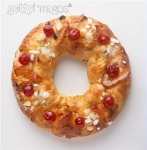
I don't want to put words in 2012 New Orleans' Mardi Gras King Will Ferrell's mouth, but he might be saying, "Let them eat King Cake." Today is Fat Tuesday, after all.
Some fats promote good health, some don't. The Mayo Clinic recommends you enjoy good fats -- in moderation. But today you eat. Tomorrow, Ash Wednesday, you fast -- and moderation blows. Click here if you've already "blown it" and suffered a heart attack.
How do I know which fats are bad for me?
Saturated Fat (BAD): Cheese, pizza, grain-based desserts, some chicken dishes, sausage, hot dogs, bacon and ribs. Other sources: lard, butter, and coconut, palm and other tropical oils. Saturated fat raises low-density lipoprotein (LDL) "bad" cholesterol and increases your risk of cardiovascular disease (CVD). It may also increase your risk of Type 2 diabetes. It should have a mnemonic device -- maybe "Last Dance, Ladies."
Trans fat (BAD): Margarines, snack foods, prepared desserts like cookies and cakes. Naturally-occurring sources include meat and dairy products, but most come from processed foods we're used to buying because they're easier to cook and take longer to spoil.
Research shows these synthetic trans fats can increase unhealthy LDL and lower the good HDL, high-density lipoprotein cholesterol, increasing your risk of CVD. Most saturated and trans fats are solid at room temperature -- beef fat, pork fat, shortening, stick margarine and butter.
How do I know which fats are good for me?
Monounsaturated Fat (MUFAs): from a variety of foods and oils (olive oil, peanut oil, canola oil, avocados, poultry, nuts and seeds). The current thinking is that MUFAs decrease your risk of heart attack. MUFAs may improve insulin levels and blood sugar control if you have Type 2 diabetes.
Polyunsaturated Fat (PUFAs): found mostly in plant-based foods and oils like safflower, sunflower, soy, cottonseed, peanut oil -- poultry, nuts and seeds. Eating PUFAs decreases your risk of heart disease. PUFAs may also decrease the risk of Type 2 diabetes.
The PUFA -- omega-3 fatty acids -- may be especially beneficial to your heart. Omega-3s come in fatty fish (also the name of a favorite restaurant of mine) salmon, mackerel, herring, ground flaxseed, flax oil and walnuts). They seemingly lower the risk of coronary artery disease and protect against irregular heartbeats and lower blood pressure levels.
MUFAs and PUFAs are liquid at room temperature -- olive oil, safflower oil, peanut oil.
A few words about cholesterol
Cholesterol isn't a fat -- it's fat-like. Cholesterol is vital because it builds your body's cells and produces hormones. Your body makes some cholesterol on its own -- in fact, it makes all the cholesterol it needs on its own.
Your body doesn't need the cholesterol it gets from meat, eggs, chicken, hamburgers, non-fatty fish seafood and dairy products. Too much cholesterol from these sources increases LDL (BAD).
Because some dietary fats are potentially helpful and others potentially harmful to your health, it pays to know which ones you're eating and whether you're meeting national recommendations. The 2010 Dietary Guidelines for Americans, issued by the Department of Agriculture, offer recommendations about dietary fat intake and how to calculate the right amount for you. Click here for the calculator.
Here are some safe bets for decreasing bad fat in your diet:
• Read food labels and ingredient lists and avoid products with partially hydrogenated vegetable oil listed among the first ingredients.
• Saute with olive oil instead of butter.
• Use olive oil in salad dressings and marinades. Use canola oil when baking.
• Use egg substitutes instead of whole eggs when possible.
• Sprinkle slivered nuts or sunflower seeds on salads.
• Snack on a small handful of nuts rather than potato chips or processed crackers. Unsalted peanuts, walnuts, almonds and pistachios are good choices.
• Try nonhydrogenated peanut butter or other nonhydrogenated nut-butter spreads. Spread them on celery, bananas or whole-grain toast.
• Add slices of avocado, rather than cheese, to your sandwich.
• Prepare fish such as salmon and mackerel instead of meat twice a week. Limit sizes to 4 ounces of cooked seafood per serving.
Many foods contain multiple kinds of fat and varying levels of each type. For example, butter contains unsaturated fats [GOOD], but a large percentage of the total fat is saturated fat [BAD]. And canola oil has a high percentage of monounsaturated fat [GOOD] but also contains smaller amounts of polyunsaturated [GOOD] and saturated [BAD] fat.

Confused? Who wouldn't be? Today, let them eat King Cake!
Photos via Getty.
---
Heart attack survivors, please click on this link and take the Yale Heart Study. If you haven't had a heart attack, click and forward to someone you love who has had a heart attack. Thank you.
Disclosure: Suzanne O'Malley is a Senior Research Associate for the non-profit NIH-funded Yale Heart Study, application period is now open for her creative and screenwriting classes this summer at Yale Writers' Conference & Yale Summer Film Institute.
For more by Suzanne O'Malley, click here.

